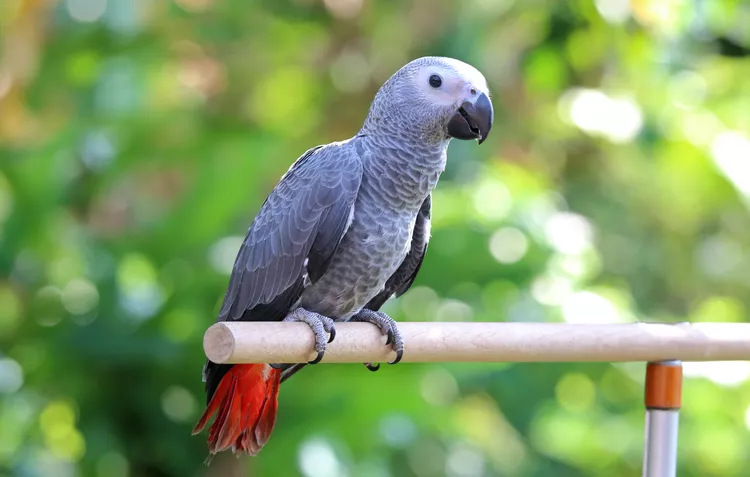
NC State CVM Parrot Cognition and Behavior Symposium
October 5 - 6, 2024
The NC State Exotic Medicine Service and the Wildlife, Avian, Aquatic, and Zoological Medicine Club invites veterinarians, veterinary technicians & assistants and other professionals to attend the 2024 Parrot Cognition and Behavior Symposium Symposium. All avian/bird enthusiasts and rescue workers are welcome!
It is important to acknowledge and to deal with the intelligence and cognitive abilities of parrots to prevent behavior problems. The first part of the presentation provides evidence of parrot cognitive processes (probabilistic reasoning, visual working memory) that are as good as, or better than those of 6- to 7-year-old human children.
The second part of the presentation examines how to use this intelligence to avoid and correct behavior problems. Ignoring parrots’ abilities to respond to negative effects of human body language and human attitude can contribute to behavior problems. The questions will be addressed: How to ensure the parrot’s experience to be approached and treated with respect and how to create mutual respect and trust?
A 5-step protocol is developed and will be discussed as a tool to show respect for parrots as intelligent prey animals, to create and reward desired behavior, to reduce the stress of handling, and to create mutual trust. Definitions of normal behavior, unwanted behavior, desired behavior, enforced behavior, and displacement behavior are described as tools to understand parrot behavior. Understanding and using displacement behavior is crucial as a method to prevent behaviour problems and as tool to solve behaviour problems. Lack of privacy will be discussed as reason for behaviour problems and as reason for health problems. Furthermore, wing clipping can make it possible to offer parrots more freedom as companion birds and to become part of the family flock inside as well as benefit outside from the social
interaction, exercise, the sun and fresh air. Lastly, the disadvantages of having a parrot on the shoulder are discussed.
Registration
- Bird Owners (Saturday only) $40.00
- Veterinary Professionals (Saturday only: 5.75 hrs CVME) $40.00
- Veterinary Professionals (Saturday & Sunday) $90.00
- NC State veterinary students (WAAZM members): $15.00
- NC State veterinary students (non WAAZM members): $20.00
- The symposium offers 8.75 hours Continuing Veterinary Education Credit approved by the NCVMB
- Thanks to the cooperation with Stephanie Lamb and Harrison’s Bird Foods, all participants received the book, Caring for Parrots by Drs. Jan Hooimeijer for free
Includes Breaks, lunch and electronic proceedings
Saturday Schedule
| Time | Topic | Presenter |
|---|---|---|
| 9:00 – 9:30 AM | Registration Check-in | |
| 9:30 – 11:00 AM | What do we know about the intelligence/cognition of parrots? | Irene Pepperberg, PhD, SB, MA |
| 11:00 – 11:15 AM | Q & A | |
| 11:15 – 11:30 AM | Break | |
| 11:30 AM – 1:00 PM | Dealing with welfare of parrots in captivity | Jan Hooimeijer, DVM, RPBC |
| 1:00 – 2:00 PM | Lunch | |
| 2:00 – 3:15 PM | Preventing, dealing with, and solving undesired behavior, | Jan Hooimeijer, DVM, RPBC |
| 3:15 – 3:45 PM | Parrots don’t bite children | Jan Hooimeijer, DVM, RPBC |
| 3:45 – 4:00 PM | Break | |
| 4:00 – 4:30 PM | Why is hand rearing of parrots prohibited in the Netherlands | Jan Hooimeijer, DVM, RPBC |
| 4:30 – 5:00 PM | How to approach and handle parrots | Jan Hooimeijer, DVM, RPBC |
Sunday Schedule
| Time | Topic | Presenter |
|---|---|---|
| 9:00 – 10:30 AM | The Rival/Model Concept | Irene Pepperberg, PhD, SB, MA |
| 9:00 – 10:30 AM | The 5-Step Behavior Protocol | Jan Hooimeijer, DVM, RPBC |
| 10:30 – 10:45 AM | Break | |
| 10:45 AM – 12:15 PM | The Rival/Model Concept | Irene Pepperberg, PhD, SB, MA |
| 10:45 AM – 12:15 PM | The 5-Step Behavior Protocol | Jan Hooimeijer, DVM, RPBC |